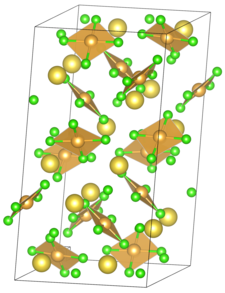User:Fasnon/sandbox4
 | |
| Names | |
|---|---|
| IUPAC name
Sodium tetrachloroaurate (III)
| |
| Other names
Sodium gold chloride, yellow gold chloride
| |
| Identifiers | |
3D model (JSmol)
|
|
| ChemSpider | |
PubChem CID
|
|
| |
| |
| Properties | |
| NaAuCl4 | |
| Molar mass | 361.756 g/mol |
| Appearance | Orange golden solid |
| Density | 0.8g/ml (20°C)[2] |
| 139g/ml (10°C) 151g/ml (20°C) 900g/ml (60°C)[3] | |
| Solubility | Sparingly soluble in diethyl ether [4] |
| Hazards | |
| GHS labelling: | |

| |
| Warning | |
| H315, H319, H335 | |
| P261, P264, P271, P280, P302+P352, P304+P340, P305+P351+P338, P312, P332+P313, P337+P313, P362+P364, P403+P233, P405, P501[5] | |
Except where otherwise noted, data are given for materials in their standard state (at 25 °C [77 °F], 100 kPa).
| |
Gold tetrachloroaurate is an inorganic compound with the chemical formula NaAuCl4. It is composed of the ions Na+ and AuCl4-. It exists in the anhydrous and dihydrate states. At room temperature, it exists as a golden-orange solid. The anhyrous and dihydrate forms are available commercially. [6]
Preparation
[edit]The conventional method of preparation of sodium tetrachloroaurate involves the addition of tetrachloroauric acid solution to sodium chloride or sodium carbonate to form a mixture. The mixture is stirred at 100° C, and then subjected to evaporation, cooling, crystallization, and drying to obtain the orange crystals of sodium tetrachloroaurate.[7] [4]
However, more efficient preparation methods have been discovered recently. These are the addition of gold with sodium oxy-halogen salts and hydrochloric acid.[7]
Uses
[edit]It is used in a wide range of applications. For example, it is used as a catalyst for the hydrochlorination of acetylene, or the oxidation of sulfides. [4]
References
[edit]- ^ PubChem. "Sodium tetrachloroaurate". pubchem.ncbi.nlm.nih.gov. Retrieved 2019-05-19.
- ^ "13874-02-7 - Sodium tetrachloroaurate(III) dihydrate, Premion®, 99.99% (metals basis), Au 49-50% - Sodium chloroaurate(III) - Gold sodium chloride - 12148 - Alfa Aesar". www.alfa.com. Retrieved 2019-05-19.
- ^ Perry, Dale L. (2011). Handbook of Inorganic Compounds. CRC Press; 2 edition (May 18, 2011). p. 380. ISBN 9781439814611.
- ^ a b c Westcott, Stephen A. (2001), "Sodium Tetrachloroaurate(III)", Encyclopedia of Reagents for Organic Synthesis, American Cancer Society, doi:10.1002/047084289x.rs108, ISBN 9780470842898, retrieved 2019-05-20
- ^ "Sodium Tetrachloroaurate". www.espimetals.com. Retrieved 2019-05-20.
- ^ PubChem. "Sodium tetrachloroaurate". pubchem.ncbi.nlm.nih.gov. Retrieved 2019-05-19.
- ^ a b 20180208476, LU, Lin; Wang, Chen-hsiang & Fan, Kuei-sheng et al., "Method of Making Inorganic Gold Compound", issued 2018-07-26


![{\displaystyle {\ce {H[AuCl4] + NaCl -> Na[AuCl4] + HCl}}}](https://wikimedia.org/api/rest_v1/media/math/render/svg/33a4338b58853589f262049d2a0b10f0ba9db840)
![{\displaystyle {\ce {2H[AuCl4] + Na2CO3 -> 2Na[AuCl4] + H2O + CO2}}}](https://wikimedia.org/api/rest_v1/media/math/render/svg/9f7b32ba19756b1e1480e2fa001033f139de3ffb)